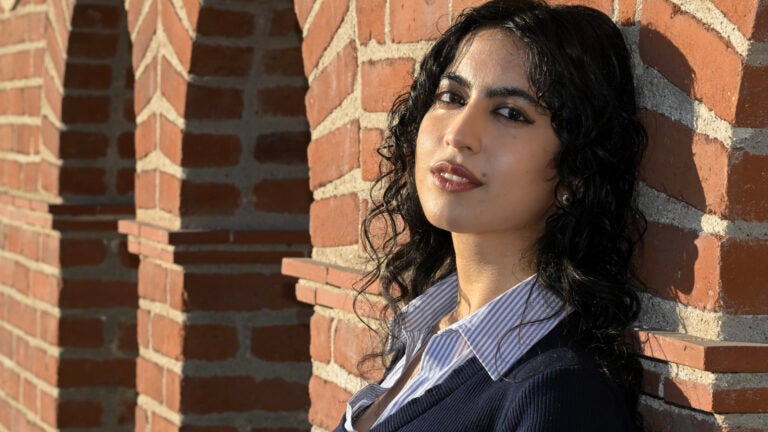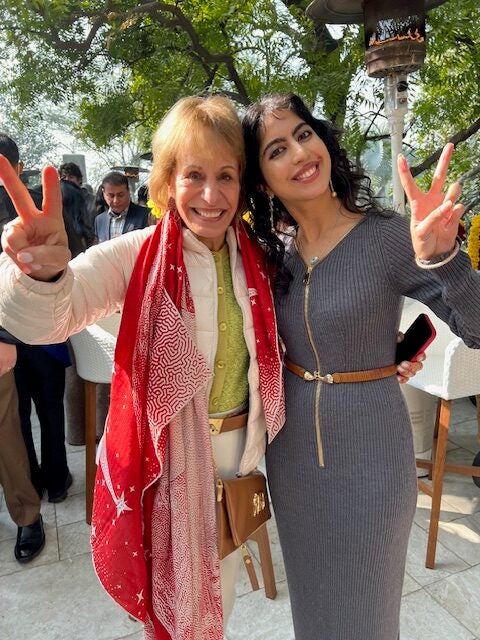
Elevating the voices of marginalized groups through film is a career focus for Aneesha Madhok ’18. (USC Photo/Gus Ruelas)
Aneesha Madhok: Emissary of global cinema
How the USC School of Dramatic Arts alumna is elevating unheard voices as an actress, writer and director.
In her breakout role in the film Bully High (2022), Aneesha Madhok ’18 plays a Pakistani exchange student at a Southern California high school who is bullied for her Muslim identity. The character, Maryam, triumphs over her tormentors by verbally confronting them.
“I’m a very diplomatic person in real life, but this character was not,” says Madhok, who won best actress at the Mumbai International Film Festival in India for the role. “I learned one thing: Being silent is not the answer.”
Elevating the voices of marginalized groups through film has become a career focus for Madhok, who was born in Nairobi, Kenya, and raised in New Delhi, India. She earned her bachelor’s degree at the USC School of Dramatic Arts, with a minor in screenwriting from the USC School of Cinematic Arts. Bully High, in which she was cast shortly after graduating, opened doors for her in both Hollywood and India’s Bollywood. The actor, writer and director now splits her time between New Delhi and Los Angeles.
“I go back and forth because I can never have enough of the two worlds,” she says.
On a recent Friday, Madhok returned to the USC University Park Campus for the first time since graduating in 2018. She was in Los Angeles to find partners for two projects she’s written and intends to act in — both featuring characters who straddle two cultures. One is a television series about an American spy living in India; the other is a feature film about an Indian American ballerina who carves her own path by fusing ballet with traditional Indian dance.
Madhok plans to collaborate with directors who share her passion for centering characters and cultures that are not often portrayed in mainstream Hollywood films. “My mission is to make global cinema,” she says.
During her visit to campus, she toured the new Dramatic Arts Building, which opened in March as the first dedicated brick-and-mortar home for the nearly 80-year-old school. Madhok was overcome with emotion as she surveyed the state-of-the-art facilities housed in a historic building.
“The feeling that hit me was, ‘Wow, look how far the School of Dramatic Arts has come,’” she says.
Madhok has come a long way since graduating, too. “Aneesha’s career progression exemplifies the type of multihyphenate artist we educate at the School of Dramatic Arts,” says Emily Roxworthy, dean of the School of Dramatic Arts. “On a global scale, she is a trailblazer and a leader, with a seemingly unending range in standup comedy, contemporary dance and film, and so much more.”
USC as launching pad
Madhok began acting and dancing on stage at age 3. As a school-age child, she was bullied by classmates and turned to these art forms for refuge. At 17, she wrote and starred in the play Aliza-Free, about a visually impaired dancer. When the play garnered acclaim in India, she set her sights on theater school in Los Angeles.
“USC was my No. 1 dream school,” says Madhok, whose brother, sister-in-law and cousin also attended USC.
Fond memories of her undergraduate days include cruising around on campus on her pink Penny Skateboard, becoming president of the USC standup comedy club and soaking up as much knowledge as she could from her professors with wide-eyed curiosity.
“USC has a lot to offer, and the deeper you dig in, the more you get,” Madhok says. “When you make use of the resources here, pragmatically speaking, the sky’s the limit.”
Wayne Federman, part-time lecturer at the School of Dramatic Arts, remembers that when Madhok took his standup comedy class in 2017, she was intensely focused on improving her comedy craft. “Aneesha had a belief in herself and an unrelenting work ethic,” Federman says. “She manifested her success with a potent combination of sincerity, hard work, determination and talent. I’m over-the-moon proud of her accomplishments.”
The friendships Madhok made on campus also helped launch her career. A few months after graduation, a former classmate tipped her off to a casting opportunity in the play Infidel by Christopher Vened at the Whitefire Theatre in Sherman Oaks. The director was looking for a woman who spoke Farsi to play the lead. Madhok — a self-described “language nerd” who is fluent in English, Hindi, Punjabi, Farsi and Spanish and speaks some Greek and Hebrew — landed the role.
In another stroke of serendipity, Bill McAdams Jr., who had written the screenplay for Bully High and was looking to cast the role of Maryam, happened to be in the audience at the Whitefire Theatre one night during the play’s run. After seeing Madhok’s performance, “he told me that he had a gut feeling that I was the character,” she says. She auditioned and got the part.
“I’m really, really grateful that I’ve gotten to tell meaningful stories and be a part of them,” Madhok says, crediting her USC professors with preparing her to portray complex characters. “That education makes me the artist that I am today,” she says.
Debra De Liso, part-time lecturer at the School of Dramatic Arts, notes Madhok’s extraordinary charisma and ability to solidly stay in character. “Aneesha is a maverick and a one-of-a-kind creator,” says De Liso, who taught an improv class that Madhok attended and collaborated with her on a short film script after she graduated. “I look forward to watching her star rise!”
Nurturing global connections

A self-professed “proud Trojan,” Madhok wants to help USC grow its longstanding ties with India. In January, when USC President Carol Folt led a delegation composed of deans, faculty researchers and senior administrators on a three-city tour in India branded “USC-India: Partner the Future,” Madhok was among the Indian alumni who joined the events. The trip built on an educational and professional relationship with the country that is more than 50 years in the making.
Madhok hopes to open avenues for School of Dramatic Arts students to find theatrical career opportunities in India and other foreign film industries. “I want to help create a class [at the School of Dramatic Arts] that could offer an understanding of global cinema and how to use our theater training from USC abroad,” she says.
Though many Americans think of the Mumbai-based Bollywood industry as synonymous with Indian film, Madhok notes that opportunities abound in India’s thriving regional film industries, such as the one in the northwestern state of Punjab. In February, she made her professional directorial debut with the short film Maa, which is set in the region. The film, which Madhok also wrote and starred in, explores themes of domestic violence and generational trauma.
Getting behind the camera was a natural progression for Madhok, who sees directing as another means to tell stories of personal and cultural significance.
“Acting has always been my passion, and in order to accomplish it, I found innovative ways to express my artistry,” she says. “So, I also happen to be a writer, dancer, director, producer — wearing all those hats to make the dreams of my soul come true.”



